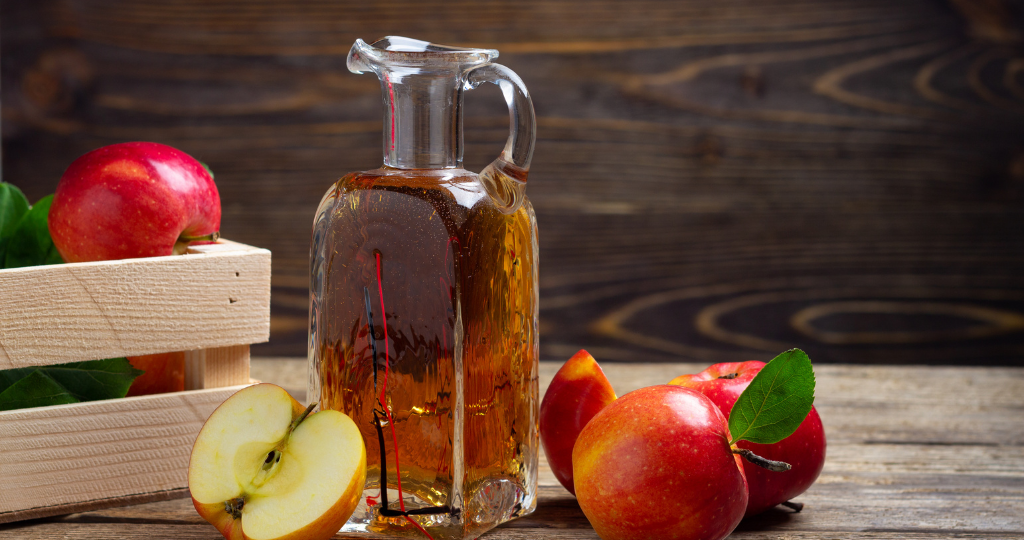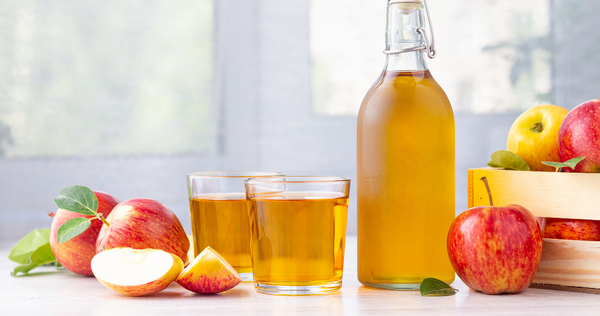
Apple Cider Vinegar vs Distilled Vinegar: Which is Best Vinegar?
Vinegar is a common ingredient used in cooking and cleaning, and it comes in many forms. Two popular types are apple cider vinegar and distilled white vinegar. While they share some similarities and uses, key differences set them apart.
Apple cider vinegar is made from fermented apple juice and possesses a fruity, tart flavour profile. Its production process and inclusion of the "mother" result in certain nutritional components that make it attractive from a health perspective.
Distilled white vinegar has higher acidity levels since it is diluted acetic acid, giving it more cleaning and pickling utility. This article explores production methods, culinary roles, and wellness impacts to highlight the contrasts between these two household staples.
What is Apple Cider Vinegar?
Apple cider vinegar stands apart from other vinegars in its production process and its ties to traditional wellness practices. Unlike distilled vinegar, ACV is made through a two-step fermentation process using actual apple cider, giving it a fruity aroma and a smooth, tart taste. People have used raw, unfiltered ACV for centuries as both a health tonic and culinary ingredient.
While the science is still emerging on many of its specific benefits, its rich history speaks to why people view apple cider vinegar as special compared to other types of vinegar. Moreover, when debating Apple Cider Vinegar vs Distilled Vinegar, it's crucial to consider their distinct flavours and how they can enhance various dishes.
Characteristics of Apple Cider Vinegar
- The cloudy shade ranging from light golden to deeper amber is created by the "mother" - strands of proteins, enzymes, and friendly bacteria that give apple cider vinegar its nutritional value.
- An interplay of sweet and sour flavours creates a fruity tanginess. The tartness comes from acetic acid and malic acid, compounds in apple cider.
- As you bring apple cider vinegar near your nose, it releases a mellow, appley aroma. It smells fresh and bright instead of too strong or unpleasant.
- The "mother" present in unfiltered ACV contains strands of proteins, enzymes, and probiotic bacteria that form during fermentation by acetic acid bacteria.
- Acetic acid gives ACV its sour taste and pungent smell. But when diluted, it provides ACV’s health benefits - balancing pH, supporting weight management and more.
Benefits of Apple Cider Vinegar
- Improves gut health and digestion: Contains probiotics and enzymes that help populate the gut with healthy bacteria. This improves digestion, nutrient absorption, and bowel regularity.
- Balances blood sugar levels: Acetic acid improves insulin sensitivity and slows digestion of carbs, helping stabilise blood sugar spikes after meals. Vinegar also blocks some starch enzymes.
- Provides antioxidants: Apple cider vinegar contains chlorogenic acid and other antioxidants that combat cell damage by neutralising free radicals. This helps reduce oxidative stress and chronic disease risk.
- Boosts immunity: The probiotics, acetic acid and nutrients like Vitamin C, calcium and magnesium support immune function. Some studies show vinegar reduces cold/flu by alkalising blood pH levels.
- Supports healthy weight loss: Acetic acid may suppress fat accumulation and speed up metabolism. The pectin fibre and appetite-reducing effects could also decrease caloric intake and lead to mild weight loss.
What is a Distilled Vinegar?
The fermentation of distilled alcohol produces distilled vinegar. After the initial fermentation process, the alcohol is turned into vinegar, and the liquid is heated and purified through steam distillation. This additional step removes almost all impurities and non-acetic components, producing a clear, sharply acidic vinegar perfect for pickling and preservation.

The most common type of distilled vinegar is white distilled vinegar, made from grain alcohol. With its exceptionally high acetic acid level and crisp, spicy bite, distilled vinegar brings powerful acidity to recipes. Moreover, in the comparison of Apple Cider Vinegar vs Distilled Vinegar, their acidity levels play a significant role in culinary applications.
Characteristics of Distilled Vinegar
- Distilled vinegar has a clear, transparent look without any cloudiness or sediment. Its colour ranges from colourless to pale yellow or light amber.
- The taste is sharp, acidic, and tart, without overt complex flavour notes. It tends to have a cleaner flavour than other vinegar since impurities are removed during distillation.
- Most distilled vinegar has a 4-7% acetic acid level, which provides its tangy taste and functional benefits. A higher percentage is not necessarily better.
- Distilled vinegar has lower nutrient content since distillation focuses on acetic acid and water. It does not contain the "mother" probiotics found in unpasteurised vinegar.
Benefits of Distilled Vinegar
- Powerful Natural Cleaner: Distilled vinegar is acidic, which helps it break down and dissolve things like mineral deposits. You can use it to clean windows, floors, and other surfaces without harsh chemicals.
- Odour Eliminator: Vinegar helps neutralise and get rid of bad smells around the house. It works by killing the bacteria that cause odours on surfaces and in the air.
- Natural Weed Killer: Spraying full-strength distilled vinegar directly on weeds can effectively kill them. Using vinegar instead of chemical herbicides keeps your soil healthy.
- Food Preserver: The acetic acid in vinegar acts as a natural preservative. This helps extend the shelf life of pickles, relishes, sauces, and other preserved foods.
- Health Benefits: Some early research suggests that distilled vinegar may help with blood sugar control and heart health. It's a common ingredient in natural health remedies.
Apple Cider Vinegar vs Distilled Vinegar
|
Basis of Difference |
Apple Cider Vinegar |
Distilled Vinegar |
|
Nutritional Value |
Rich in vitamins and minerals, Contains potassium and amino acids |
Fewer nutrients, Easier composition |
|
Acid Concentrations |
Slightly lower acidity (5-6%) |
Higher acetic acid concentration (5-8%) |
|
Colour |
Golden or amber |
Clear or "white |
|
Cooking Uses |
Fruity taste suitable for salads, marinades, beverages |
Versatile: pickling, baking, cleaning fruits and vegetables |
|
Fermentation |
Two-step process: apple juice to alcohol, then acetic acid |
Fermented grain alcohol, purified to strip away most flavours |
|
Household Uses |
Natural cleaner, skin and hair care remedies |
Cleaning and deodorising |
|
Taste |
Distinct, slightly sweet apple flavour |
Clean, sharp taste without imparting flavour to food |
In-Depth Comparison
1. Nutritional Value
Apple cider vinegar (ACV) contains beneficial compounds like potassium, amino acids, and antioxidants from its apple source material. This vitamin and mineral content lacking in distilled vinegar makes ACV a nutritional powerhouse. It offers a tasty health boost whether used in recipes or as a supplement. Meanwhile, distilled carries simplicity as its advantage - a neutral, purely acidic profile perfect for cooking applications where flavour takes centre stage.

2. Acid Concentrations
The slightly lower acidity of ACV (5-6%) provides pleasant brightness without overpowering other ingredients. Its mellow acidity also agrees more easily with sensitive stomachs. Distilled vinegar's higher acetic acid concentration (5-8%) makes it better suited for pickling, preserving, baking soda reactions, etc. - beneficial where more aggressive acidity is needed.
3. Colour
Unlike clear distilled varieties, ACV lends a warm amber glow to foods like salad dressings. This golden hue comes naturally from the apples used, evoking a farm-fresh, minimally processed origin that appeals to foodies seeking to avoid uniformity.
4. Cooking Uses
ACV's fruity flavour beautifully enhances marinades, salads, and drinks with tasty apple complexity unmatched by distilled vinegar. Meanwhile, distilled is preferred for pickling and cleaning fresh produce since its neutral taste doesn't interfere with the ingredients' natural flavours.
5. Taste
ACV's distinct, slightly sweet apple taste can be a delightful addition, offering a flavour profile that distilled vinegar can't match. Distilled's clean, sharp taste reliably provides background acidity without influencing the dish's flavour direction.
Conclusion
While both apple cider and distilled white vinegar offer handy cleaning, cooking, and wellness uses through their antimicrobial acetic acid content, apple cider vinegar wins out overall thanks to added health bonuses. With antioxidant and probiotic richness unmatched by distilled varieties, apple cider vinegar provides exceptional antibacterial and anti-inflammatory benefits internally when consumed and externally when applied topically.
For the widest range of natural home and body-boosting applications harnessing the full power of acetic fermentation, unfiltered organic apple cider vinegar proves the ultimate pantry staple.





